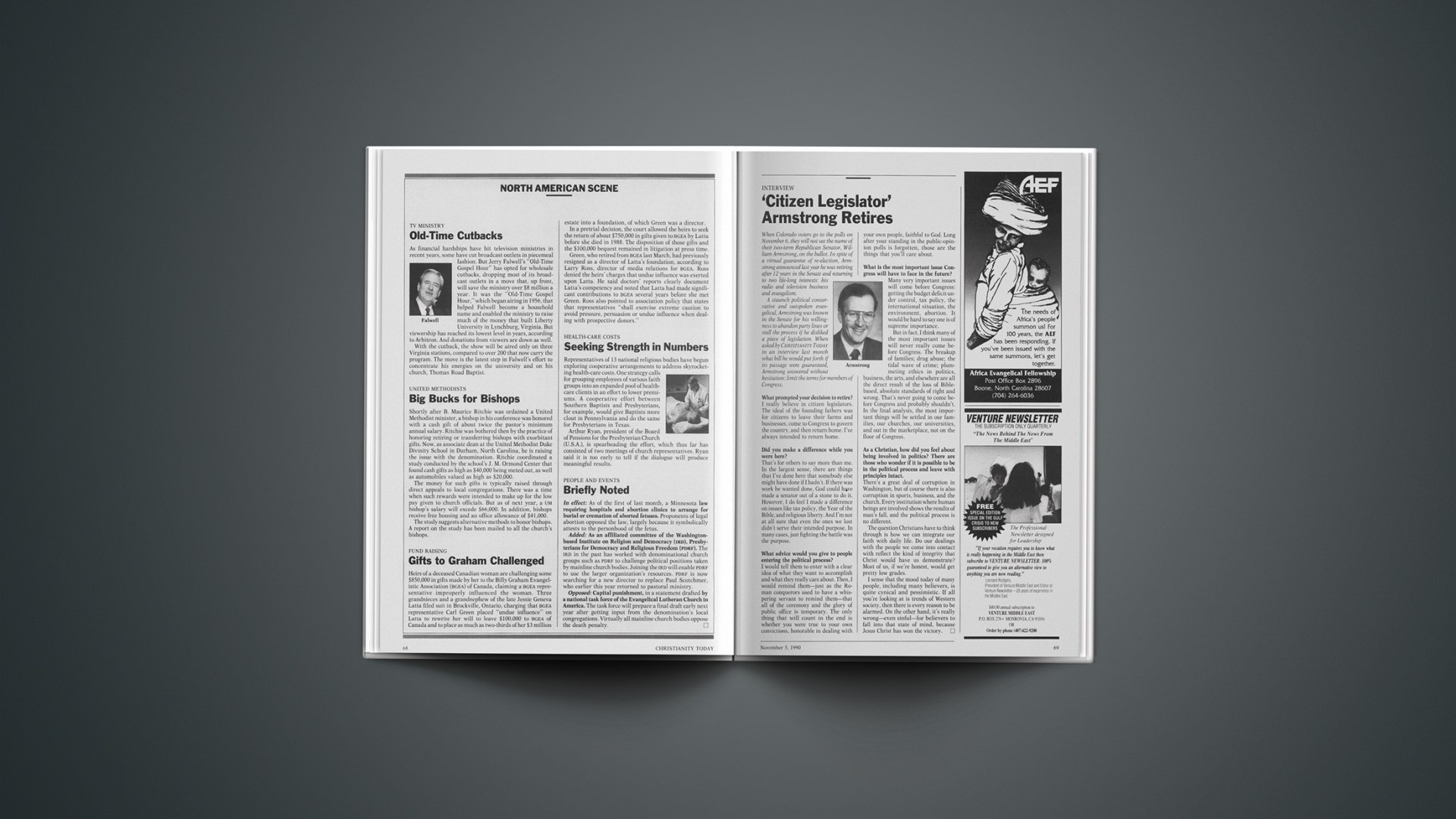When Colorado voters go to the polls on November 6, they will not see the name of their two-term Republican Senator, William Armstrong, on the ballot. In spite of a virtual guarantee of re-election, Armstrong announced last year he was retiring after 12 years in the Senate and returning to two life-long interests: his radio and television business and evangelism.
A staunch political conservative and outspoken evangelical, Armstrong was known in the Senate for his willingness to abandon party lines or stall the process if he disliked a piece of legislation. When asked by CHRISTIANITY TODAY in an interview last month what bill he would put forth if its passage were guaranteed, Armstrong answered without hesitation: limit the terms for members of Congress.
What prompted your decision to retire?
I really believe in citizen legislators. The ideal of the founding fathers was for citizens to leave their farms and businesses, come to Congress to govern the country, and then return home. I’ve always intended to return home.
Did you make a difference while you were here?
That’s for others to say more than me. In the largest sense, there are things that I’ve done here that somebody else might have done if I hadn’t. If there was work he wanted done, God could have made a senator out of a stone to do it. However, I do feel I made a difference on issues like tax policy, the Year of the Bible, and religious liberty. And I’m not at all sure that even the ones we lost didn’t serve their intended purpose. In many cases, just fighting the battle was the purpose.
What advice would you give to people entering the political process?
I would tell them to enter with a clear idea of what they want to accomplish and what they really care about. Then, I would remind them—just as the Roman conquerors used to have a whispering servant to remind them—that all of the ceremony and the glory of public office is temporary. The only thing that will count in the end is whether you were true to your own convictions, honorable in dealing with your own people, faithful to God. Long after your standing in the public-opinion polls is forgotten, those are the things that you’ll care about.
What is the most important issue Congress will have to face in the future?
Many very important issues will come before Congress: getting the budget deficit under control, tax policy, the international situation, the environment, abortion. It would be hard to say one is of supreme importance.
But in fact, I think many of the most important issues will never really come before Congress. The breakup of families; drug abuse; the tidal wave of crime; plummeting ethics in politics, business, the arts, and elsewhere are all the direct result of the loss of Bible-based, absolute standards of right and wrong. That’s never going to come before Congress and probably shouldn’t. In the final analysis, the most important things will be settled in our families, our churches, our universities, and out in the marketplace, not on the floor of Congress.
As a Christian, how did you feel about being involved in politics? There are those who wonder if it is possible to be in the political process and leave with principles intact.
There’s a great deal of corruption in Washington, but of course there is also corruption in sports, business, and the church. Every institution where human beings are involved shows the results of man’s fall, and the political process is no different.
The question Christians have to think through is how we can integrate our faith with daily life. Do our dealings with the people we come into contact with reflect the kind of integrity that Christ would have us demonstrate? Most of us, if we’re honest, would get pretty low grades.
I sense that the mood today of many people, including many believers, is quite cynical and pessimistic. If all you’re looking at is trends of Western society, then there is every reason to be alarmed. On the other hand, it’s really wrong—even sinful—for believers to fall into that state of mind, because Jesus Christ has won the victory.










